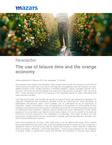
The use of leisure time and the orange economy
Few changes were made to the regulation of the orange economy with the issuance of Law 2010 of 2019 (Economic Growth Law or tax reform). Perhaps the most significant was the inclusion, as value-added industries and/or creative activities, of activities related to "sports, recreation and the use of free time". Since the law did not indicate what was to be understood by "recreation" and "use of free time", it was necessary to wait for the issuance of the regulatory decree to really understand what these activities included.
Last February 26, 2020, Decree 286 was issued, by means of which said subject was regulated. The regulation established that recreational activities should be understood as "those processes of participative and dynamic action, which facilitate (sic) to understand life as an experience of enjoyment, creation and freedom, in the full development of the potential of human beings for their realization and improvement of the quality of individual and social life, through the practice of physical or intellectual leisure activities". Likewise, leisure activities are to be understood as "those whose purpose is the constructive use that the human being makes of it, for the benefit of his personal enrichment and the enjoyment of life individually or collectively. Their basic functions are rest, amusement, complementary training, socialization, creativity, personal development, liberation from work and psychobiological recovery.
Since these activities do not have a ISIC code where it can be determined exactly which creative businesses benefit from the seven-year income exemption granted to orange economy companies, I decided to make an informal survey with my friends and contacts in social networks to determine which businesses -effectively- could fit this description. Among those proposed are: the realization of musical, artistic or gastronomic events and festivals, the realization of concerts, bars, discos, restaurants with live music or with any type of "performance", recreational activities of any nature (including casinos, gambling and all types of betting), yoga centers, pilates, massages, gyms, toy libraries and entertainment arcades, centers that offer classes in ceramics, painting, music, sewing, gardening, sculpture, dance academies, centers for training in the self, motivational and coaching activities, leadership activities for natural and legal persons, individual psychological treatments and couple therapies, emotional intelligence courses, spas, meditation centers, rehabilitation centers for any type of addiction (drugs, alcohol, gambling, smoking), bookstores-cafes, public libraries and communal entertainment spaces, carnivals, sports teams and competitions (races, expeditions, etc.), museums and all kinds of recreational activities, museums and all types of entertainment arcades. ), museums and all kinds of artistic exhibitions, urban tours with or without tourist guide, tourist recreation, sports tourism, sports festivals, sports-related businesses, collecting and exchange of objects, training schools in arts and crafts (saddlery, tailoring, jewelry) among many others that may have some relationship with recreation or leisure.
Of course, obtaining the tax benefit is not automatic. The interested company must comply with the investment and personnel hiring requirements established in the law and in the regulatory decree and obtain the approval of the Orange Economy Committee of the Ministry of Culture. Additionally, in the case of "activities related to cultural tourism" and "activities related to sports, recreation and use of free time", the Orange Economy Committee of the Ministry of Culture must have the prior favorable opinion of the Vice Ministry of Tourism of the Ministry of Commerce, Industry and Tourism and the Ministry of Sports, respectively.


